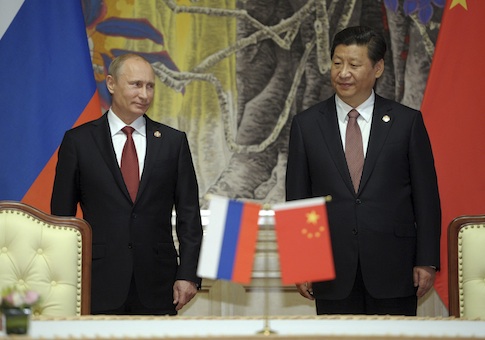In a speech delivered last Friday at an international investment forum in the Black Sea resort town of Sochi, Russian Prime Minister Dmitry Medvedev described in detail what he termed as Russia’s "pivot to Asia."
Medvedev went to unusual lengths to portray Russia’s Asia pivot in benign terms, downplaying the political ramifications for Russia’s relations with the West. But considered in light of the costs imposed on the Russian economy by new Western sanctions and the recent free-fall of the ruble, Medvedev’s remarks outlined a strategy clearly designed to blunt the effect of Western action against Russia.
The new policy would also disrupt key Western political and financial interests.
The first element of Russia’s Asia pivot was initiated in May when Russian state-controlled energy giant Gazprom signed a deal with its Chinese counterpart to provide over a thirty year period $400 billion in natural gas.
The deal reduces Gazprom’s current reliance on Europe for the bulk of its sales, which top $60 billion annually. The Russian government claims that this deal and similar proposals will boost Gazprom’s earnings from non-European customers from zero to 25 percent of its total income. The deal will also likely increase energy prices in Europe.
Another element of the Asia pivot is an agreement reached this month for Russia and China to settle at least half of their trade accounts using the yuan or the ruble—and not the dollar.
Almost all global oil sales, for example, are concluded using dollars, and traditionally Russia has lacked the financial muscle to challenge U.S. dominance in this arena on its own.
In pivoting to Asia, Medvedev and Russian President Vladimir Putin have domestic political winds at their backs. Putin’s anti-Western rhetoric and policies have been playing well in Russia, despite the occasional protest against his Ukrainian invasion, including a protest march in Moscow last Sunday.
Putin’s once sagging popularity has risen to over 80 percent approval in recent polls.
Last month, Russia announced that it would ban the import of Western food and alcohol imports, a move that punishes European farmers and U.S. poultry growers but also Russian consumers who derive as much as fifty percent of their food from Western sources.
Similarly, rumors continue to circulate about Russian interest in banning from its airspace Western commercial aviation flights bound for Asia. The Russian government would stand to lose $300 million in fees if the ban is imposed, but might offset the losses by striking new deals with Asian carriers.
In light of recent events, Goldman Sachs, JP Morgan Chase, and Bank of America Merrill Lynch are reviewing their highly lucrative partnerships with Russian corporations. The Blackstone Group, the private equity firm, is ending its contracts in Russia.
Other major points of leverage over the West remain available to Moscow. Putin could create havoc for the United States by denying the United States use of Russian territory to move its equipment out of Afghanistan.
Relations with the West will further deteriorate if Russia steps up its arms sales to such countries as Iran—which has been seeking advanced air defense equipment—or North Korea.
According to Medvedev during his speech in Sochi, Russia’s efforts to improve trade with China and other Asian nations "is not senseless revenge against Europe…but the natural course of things."
